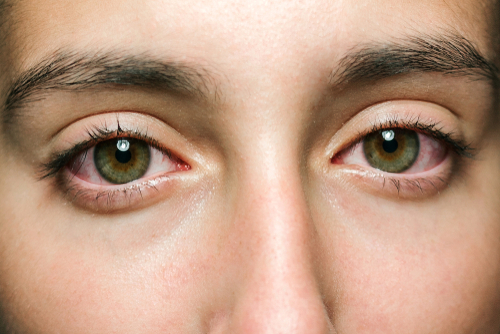Can Dry Eye Syndrome Make My Eyes Itchy?
April 24th, 2023
Do your eyes feel itchy and irritated? Itching is a symptom of dry eye, but it can also be an eye-related symptom of seasonal allergies. Seasonal allergies typically start in the spring but can be present through summer, fall, and even winter for some people.
Keep reading to learn more about dry eye syndrome and if it can make your eyes itchy!
What is Dry Eye?
One specific indication of healthy eyes is a healthy tear film, which properly lubricates and protects the eye. Dry eye syndrome occurs when your eyes aren’t able to produce enough tears or the right quality of tears to maintain proper lubrication.
Good quality tears have enough of each of these necessary components to lubricate the surface of the eye: lipid, mucin, and water. Lipids are produced by meibomiam glands in the eyelid and are released each time you blink.
They also prevent the evaporation of the eye’s natural moisture. A common cause of dry eye is meibomian gland dysfunction, which is when the meibomian glands can become blocked, reducing the amount of lipids in your tears.
Just as if other components of your tears are lacking, this can dry out the eye, making them can appear red and feel scratchy as if there’s grit or particles in them. Your eyes may itch, water excessively, and be uncomfortable.
What Are Seasonal Allergy Symptoms?
Over thirty-five million Americans suffer from seasonal allergies each year. Each month brings different allergens.
In April and May, its tree pollens. In June and July, its grass pollens. In July and August, it’s mold spores and weed pollens.
All these irritate the eyes and inflame the conjunctiva, the clear tissue that covers the white part of the eye and the inside of the eyelid. Seasonal allergic conjunctivitis is the most common allergy affecting the eye.
The eye-related symptoms of seasonal allergies are often the same as dry eye syndrome: your eyes can appear red, feel irritated and inflamed, itch and irritate you, and water excessively. The big difference between seasonal allergy symptoms and dry eye is that seasonal allergy symptoms are accompanied by nasal symptoms in the majority of cases.
Another primary symptom is intense itching. If you feel like you can’t resist the urge to rub your eyes due to intense itching, it may be more likely that you have allergies instead of dry eyes.
The only way to know for sure what is causing your symptoms is to visit your eye doctor at Laser Eye Center in Huntsville, Alabama, for an evaluation.
Managing Seasonal Allergies
If you’ve got nasal symptoms in addition to dry eye symptoms, consider taking an over-the-counter allergy medication when your symptoms flare up. However, be aware that oral antihistamines have a drying effect and can worsen your dry eye syndrome.
Use a sterile saline rinse to remove pollen and allergens from your eyes. Another way to combat eye dryness is by consistently using lubricating eye drops, known as artificial tears.
These lubricants can help restore moisture to your eye. However, this will only provide temporary relief for both dry eye syndrome and seasonal allergies.
Unlike seasonal allergies, dry eye syndrome will not come and go with the seasons. If you are diagnosed with dry eye, it’s best to stay on top of symptoms to make sure your eyes remain healthy, and your condition does not worsen.
This is the best way ensure that you’re getting an expert diagnosis and a treatment plan that accurately targets the root of the issue.
Are you experiencing eye irritation, dryness, or itching? Schedule an appointment at Laser Eye Center in Huntsville, AL, today!



